Discover the Best Board Games for Every Player
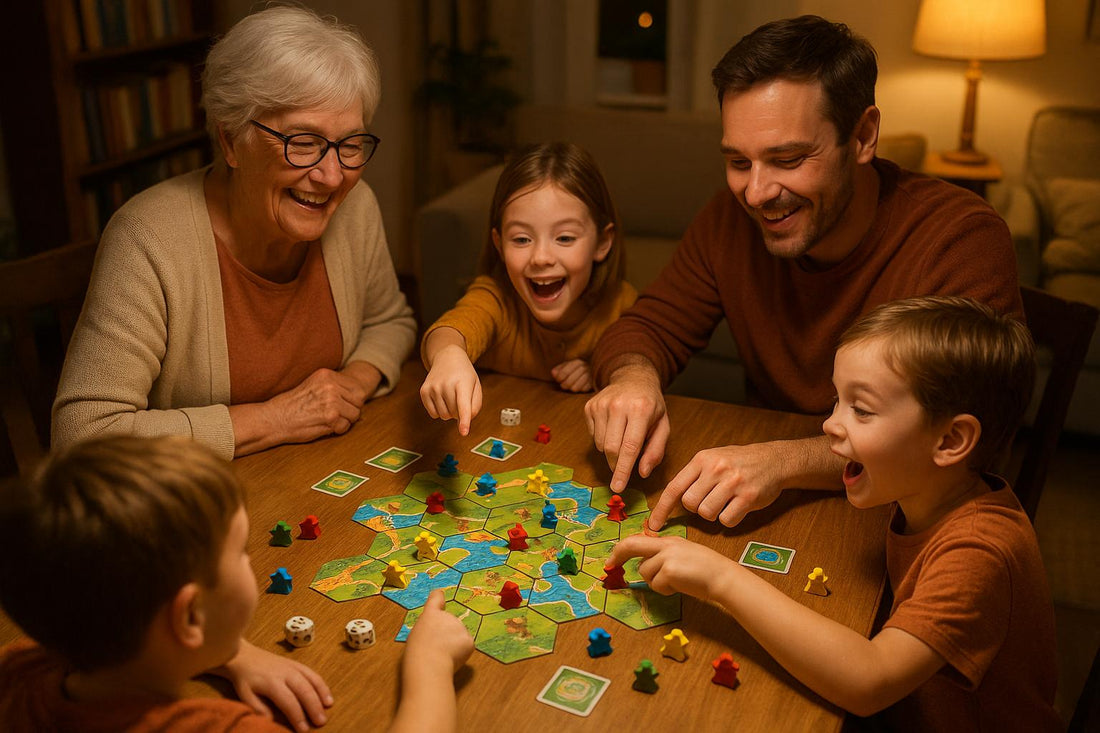
Top Brain Games for Mixed-Age Families
Looking for fun ways to bond with your family while boosting brainpower? These 10 brain games are perfect for families with kids, teens, and adults. They improve memory, problem-solving, and communication skills while making family time enjoyable. Here’s a quick overview of the best games for every age and skill level:
- Ice Cool: A flicking game for ages 6+ that sharpens hand-eye coordination and spatial reasoning.
- BrainBox: The World: A memory game for ages 8+ that teaches geography in just 10 minutes.
- Codenames: A word association game for ages 10+ that promotes teamwork and lateral thinking.
- Ticket to Ride: A train-building strategy game for ages 8+ that enhances planning and geography skills.
- Forbidden Island: A cooperative game for ages 10+ that focuses on teamwork and problem-solving.
- Concept: A visual guessing game for ages 10+ that encourages creative thinking and communication.
- Herd Mentality: A fun, social guessing game for ages 10+ that sparks group discussions.
- Sushi Go!: A fast-paced card game for ages 8+ that improves memory and decision-making.
- Dixit: A storytelling game for ages 8+ that fosters imagination and interpretation skills.
- Catan: A strategy game for ages 10+ that teaches resource management and negotiation.
Quick Comparison Table
| Game | Age Range | Players | Playtime | Key Benefits |
|---|---|---|---|---|
| Ice Cool | 6+ | 2-4 | 30 min | Hand-eye coordination, motor skills |
| BrainBox: The World | 8+ | 1+ | 10 min | Memory, visual processing |
| Codenames | 10+ | 2-8 | 15 min | Word association, teamwork |
| Ticket to Ride | 8+ | 2-5 | 60 min | Planning, geography |
| Forbidden Island | 10+ | 2-4 | 30 min | Problem-solving, teamwork |
| Concept | 10+ | 4-12 | 40 min | Creative thinking, communication |
| Herd Mentality | 10+ | 4-20 | 20 min | Social awareness, group psychology |
| Sushi Go! | 8+ | 2-5 | 15-20 min | Memory, decision-making |
| Dixit | 8+ | 3-6 | 30 min | Imagination, storytelling |
| Catan | 10+ | 3-4 | 60 min | Strategy, negotiation |
Whether you want a quick game for younger kids or a strategic challenge for older players, these games offer something for everyone. Start your next family game night with one of these top picks!
Brain Benefits of Playing Games with Your Family
1. Ice Cool

Ice Cool is a simple flicking game that's easy to pick up and great fun for all ages. It even won the Kinderspiel des Jahres award in 2017. The idea of the game is clear: players flick penguin pieces in a school to grab fish tokens, while one player acts as the "Hall Monitor."
Mind Skills Grown
Beyond playing and fun, Ice Cool brings lots of chances to make the mind better. It makes you think hard, focus, and plan ahead, while also boosting memory and how well you can see and think in space. The flicking part of the game tests your hand skills and teaches about points and paths in a hidden way, sort of like a math lesson but more fun.
Who Can Play
With a point system that makes it fair, Ice Cool works well for kids from six years old. You get points by picking cards, mixing luck with skill. This lets younger kids sometimes win against older ones, making the game stay fun for everyone. As Greg, a person who talks about games, said:
"Ice cool is a fun dexterity game easily accessible by all ages... The use of random points for scoring allows novice players to compete with expert players without removing the benefit of skill from the game." – Greg
The mix of luck and skill in Ice Cool makes it a top pick for improving memory and enjoying time with family.
Fun and Replay Value
Ice Cool shines on game nights due to its blend of creativity, easy access, and broad charm. Each round is new, with different flicking tasks and lots of laughter. New players can try practice flicks to learn the game rules before they start. Even if someone loses their ID card, they stay involved by aiming at the Hall Monitor, so everyone feels included.
Social Interaction
Changing who plays as the Hall Monitor keeps the game lively, giving all a shot to enjoy the excitement of the chase and the fun of dodging. The game leads to fun talks, as players clap for smart flicks and are shocked by close misses. Young players often wow with clever flicks, while old players can show their sharp skills. It's a game that unites old and young, mixing skills and fun well. Ready to check out another brain game? Let’s go!
2. BrainBox: The World
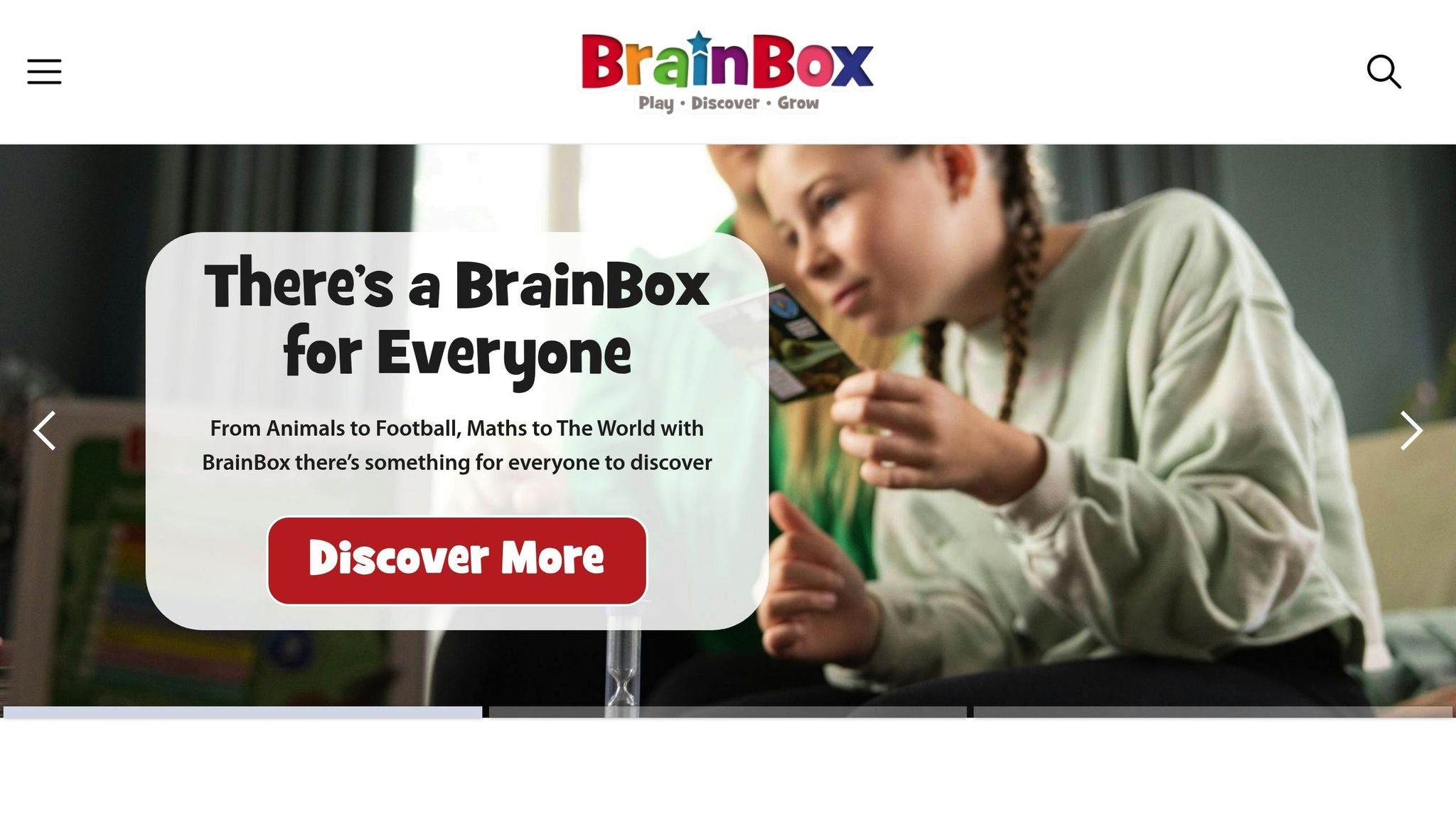
BrainBox: The World is a fast game about world places that gives you only 10 seconds to look at a card of a country and then asks you questions. It makes finding out about different parts of the Earth fun and a game to play with others. Let's see how it helps make your mind better while also bringing people close.
Making Minds Better
You get 10 seconds to note all you can from a card. You need to look fast and remember well. The thing must take in are country names, big towns, big spots, and many more. The game has 55 cards drawn by hand showing main things from each place. There are 440 things to ask about to see how good you see and remember.
For All Ages
BrainBox: The World is made for anyone who is 8 years old or more. It has lots of colors and pictures to hold the interest of young ones, while the hard asks keep grown-ups playing. With game times that are 10 minutes long, it fits anyone’s busy day or short focus times. Not a shock that reviewers on Amazon rate it high at 4.6 out of 5 stars, often saying it’s good for learning and great for family time.
Fun, Can Play More, and Time With Family
The game lets you take turns and the many different country cards mean you can play it many times. You can play on your own or with others, it’s up to you. It lets people have fun and see who can do the best and lets everyone learn together. As one person who gave feedback on Amazon, Seth Revetta, said:
"Overall it's great fun for the whole family and helps kids develop great rapid observation skills. This is a huge recommend from my entire family."
BrainBox: The World does more than just check your memory. It makes families come together with the fun of finding out and learning new stuff. It's a great mix of learning, fun, and being with family.
3. Codenames
Codenames is a word game for teams that has sold more than 14 million copies. In this game, teams give one-word hints to spot their agents while racing against the other team. Its simple idea leads to fun, smart play that makes families play it more and more. Let's look into why it is so loved.
Brain Skill Growth
Codenames makes your mind work hard. Players keep many facts in mind, which helps make their memory and thinking speed better. The spymaster must think of smart ways to link words that don't relate, while team members use logic and ideas to figure out the hints. As they play, players get better at solving problems, thinking, and making choices. It's a game that pushes you to think quick while guessing how others might see your moves.
Right Age to Play
The normal Codenames game is best for those 10 and older, but younger kids can play the Disney Family Edition, which has both pictures and words and is good for kids as young as 8. The game's flexibility is also a big bonus - you can use a 4x4 grid for a simpler play or keep the usual 5x5 grid for more of a challenge. This changeability makes it great for groups with different ages and ability levels.
Teamwork
At its heart, Codenames is all about working together. The game pushes talk, working as a team, and shared plans, making it great for bringing people closer. Its quick rounds - usually 15 to 20 minutes - let players switch roles and try new ways, keeping it new and fun. More than just a mental test, the game's focus on talking and working together helps build strong family ties and makes times to remember.
Fun and Worth Playing Again
With over 31,000 Amazon reviews and an amazing 4.8-star score, Codenames has shown it can last. The always different word sets and unexpected play make sure it stays fun. Many families get so pulled in that their game nights go way past bedtime. It’s no shock that Codenames has become a go-to for many homes looking for fun and togetherness.
4. Ticket to Ride
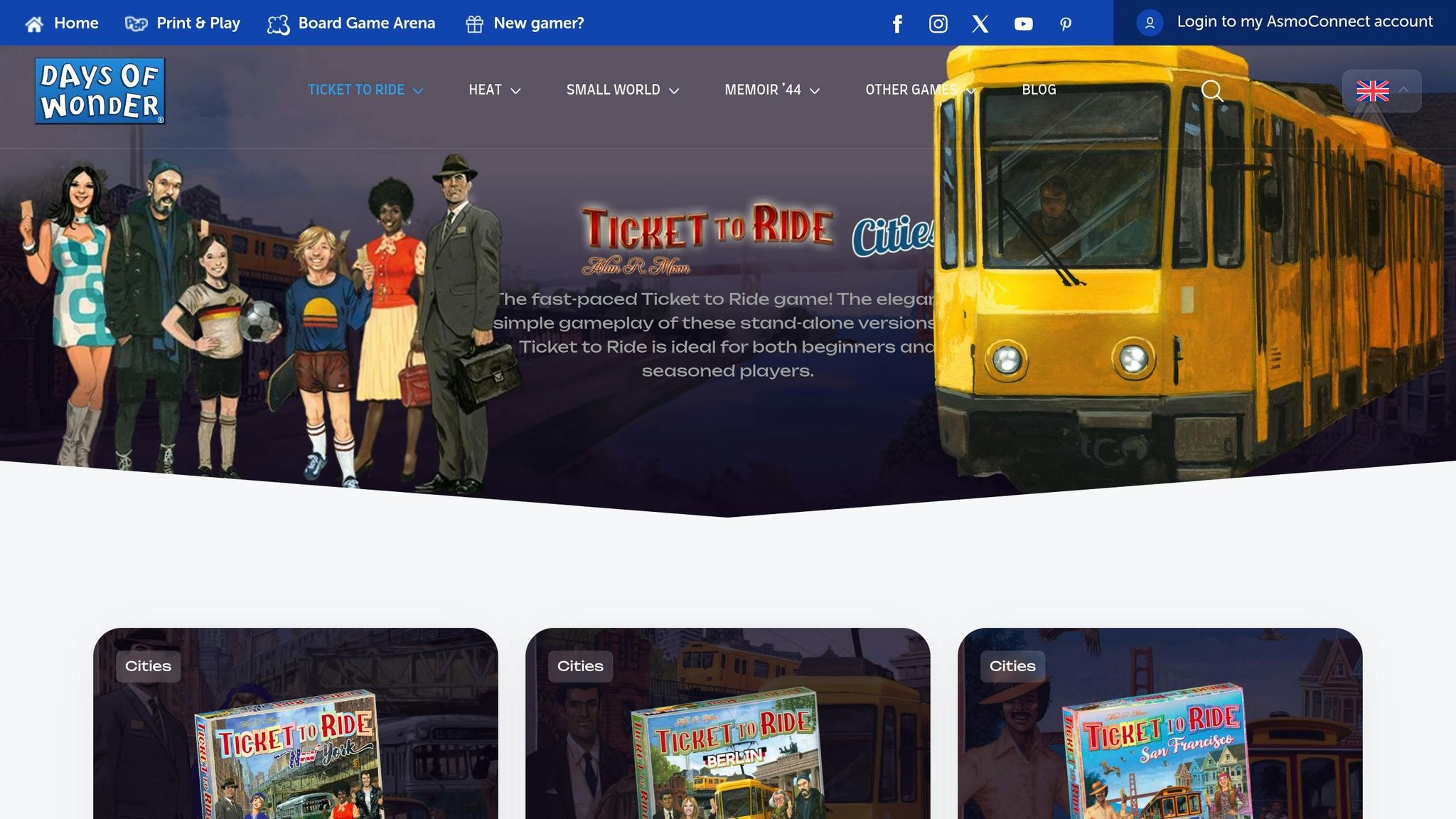
Ticket to Ride is a train game that won top awards in 2004. It asks players to build train tracks on a map, get train cards, and end tasks to win points. It stands out as it has simple rules and good plans, making it loved by all types of families. Let's look at why this game is great for everyone.
Who Can Play
One key thing that keeps Ticket to Ride loved is that all ages can play it. The first game is best for those 8 and older, while Ticket to Ride: First Journey is made easy for kids 6 and up. It's a top pick for families with either young kids or big-time players.
"Ticket To Ride is a classic game and there is a reason why it has won so many awards. Its accessibility for those not accustomed to the modern era of board gaming means everyone will enjoy it." - Board Game Review
The game's easy rules let beginners jump right in, while its deeper layers of play engage more seasoned gamers. BoardGameReview gave it a high score of 4.7 out of 5, noting its charm for both gamers and non-gamers.
Brain Power Boost
Playing Ticket to Ride isn't just fun - it's also good for your mind. It pushes you to think hard, do quick math, and see space as you map out paths and handle your game pieces. You have to weigh your choices, score points, and make moves that affect the whole board.
The part where you figure out space is really pulling. You must picture your paths while guessing where others might block you. This keeps your focus and memory sharp as you switch up plans on the spot. The skills in critical thinking and planning that you get from the game can help you outside of it, too.
Social Play
Ticket to Ride is all about fun competition that makes friendships strong. You have to weigh gains and losses while watching what others do. The game lasts between 30 to 60 minutes - perfect to keep it interesting but also to hold everyone's focus.
"This game is super easy to learn and play... It is definitely a gateway game but like Carcassonne, Dominion or Pandemic there is a depth of strategy to get into at the same time which just doesn't exist for children's games like Trouble or Sorry." - Brendan Slade, BoardGameGeek
The social part of the game is great for nights with the family, letting everyone join in, laugh together, and enjoy some light competition.
Fun and Play Again
Ticket to Ride has sold a lot of copies all over the world, showing it's not going anywhere soon. Joyful Games gave it a 4.5 out of 5, naming it "a real classic and a top pick for family game nights". The game is just right - not too easy but not too hard. It's fun to play many times.
"Ticket to Ride is among my favorite games because it is neither complex nor too simple. It is balanced. It can be played with complete beginners and enthusiasts alike." - Joyful Games
Many paths to pick and the need to shift your plan make sure each game feels new. The well-known rules let players get right back in, making the game fun and lively all the time.
5. Forbidden Island
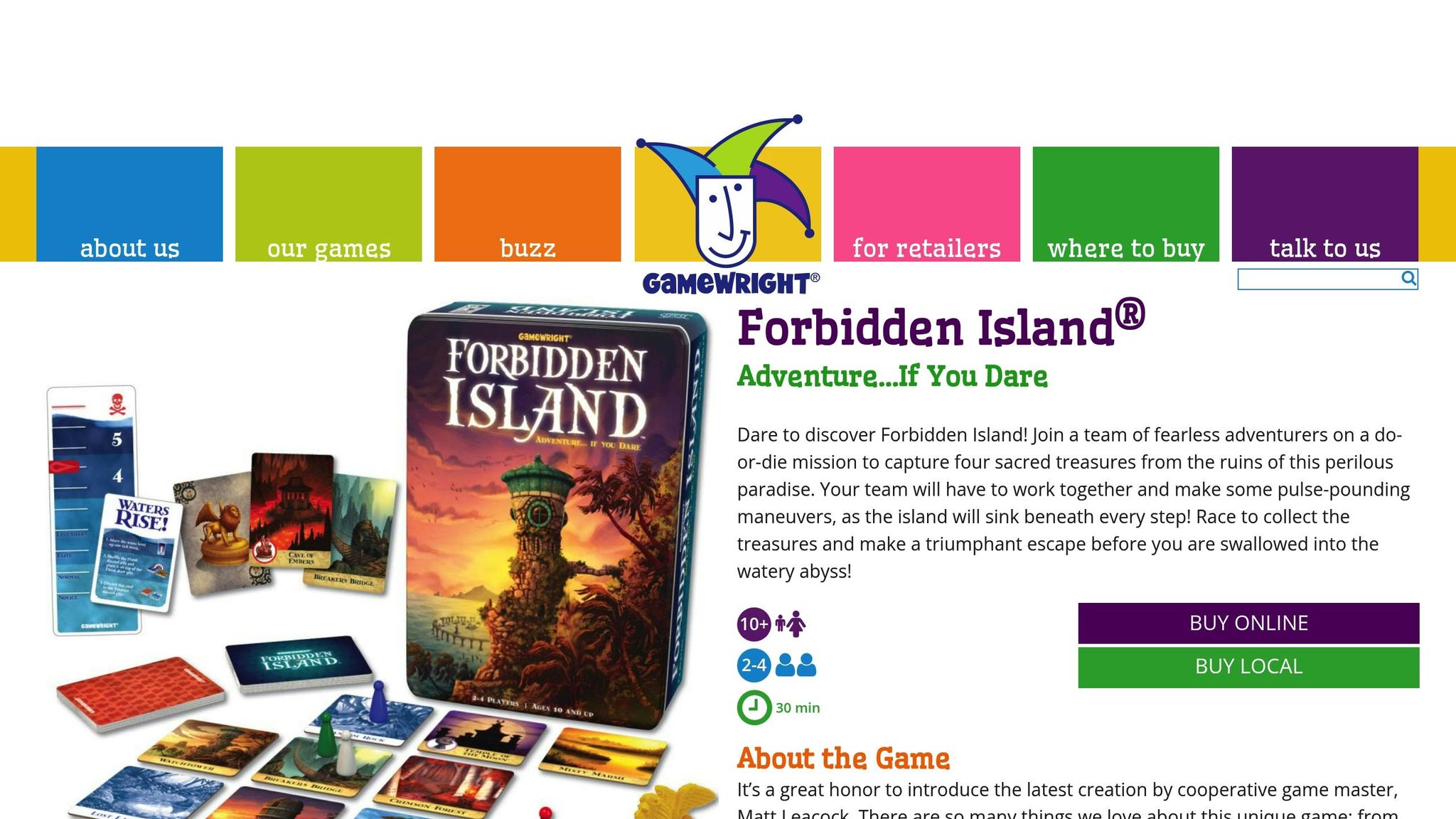
Forbidden Island is a game where all play as a team. They join up to get four rich gifts from a sinking island. As the best pick of 2010 by Mensa for brain games, it gives a fun time that's great for all ages. The game makes people work together, which helps them get closer by solving things as one. It's not too much money either. You can buy it for $15 to $28, and have lots of fun playing.
Age Range Fit
This game is made for both young ones and adults, so it's good for family play nights. Even though it says it's for 10 and up, even kids as young as 7 can have fun if they play with older ones. The game isn't too hard and has easy rules, so everyone can join in. Plus, it has bright bits and a fun board that grab both kids' and grown-ups' eyes. The way it's played means no one age group takes over and each round takes about 30 minutes.
Mind Skills Boost
It's more than just fun - it also works your mind. Players need to plan and team up to save treasures and deal with the island going under. Each move needs fast thinking - should you get a gift or help the island? You get to get better at solving things and remembering stuff. It also makes you better at thinking ahead and getting ready for your next turn. Since everyone has to work out things together, it helps you reason and talk better.
Social Time
Forbidden Island is great for making people come together. Not like other games where you face off, here you play as one group, sharing all the ups and downs. It asks you to talk and mix your skills to make a plan to save the day. The tough parts keep everyone tuned in, start talks and make you work as one. This helps not just to keep family ties strong but also builds social skills in a group scene where the goal is to win as a team, not alone.
Fun and Wanting More
Forbidden Island is full of fun, with just the right amount of hard stuff to keep you guessing till it ends. The game looks great and is made well, which makes you want to play it more. No two games are alike, thanks to how you set it up each time. It has a good 4.1 out of 5 from families who often come back to play again. Since everyone is part of the game, it makes sure no one feels left out and it keeps being a joy to play.
6. Concept
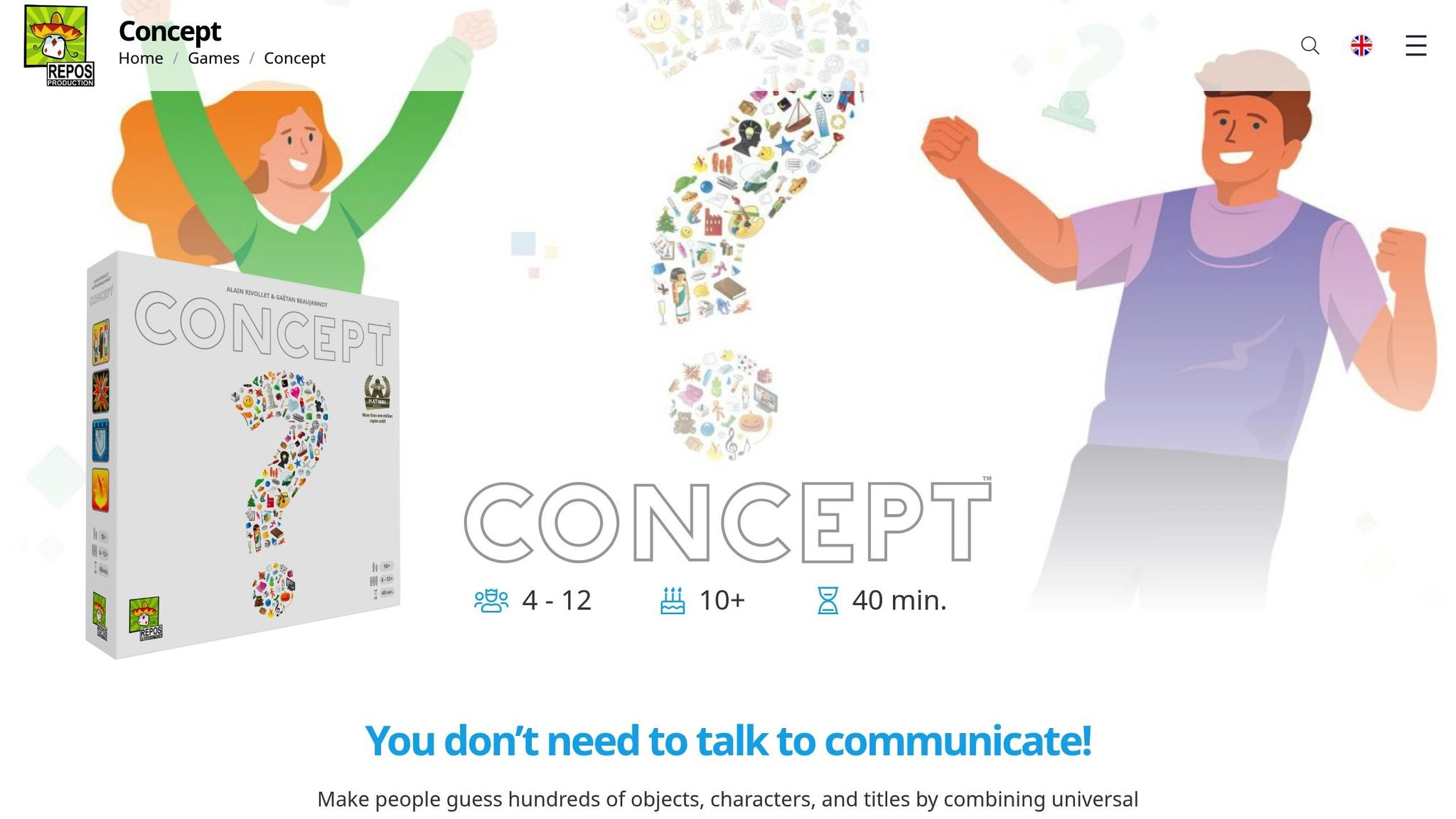
Concept is a team game where you guess things like movies or people using icons and signs. You do not need good words or art skills. You just place bright icons on the board to show your thoughts. This makes it fun and easy for everyone to play, no matter how old.
Age Range Fit
Concept works with how we see things, drawing in both kids and grown-ups. The game is easy because you link pics, not learn hard rules or know a lot of facts. Adults might think too hard about their hints, but kids tend to keep it simple. This mix lets different ages work well together, each bringing their own way of solving problems.
Brain Skill Growth
Every turn makes you turn thoughts into images, making you better at solving problems and thinking deeply. Trying an icon mix, then changing if needed, teaches you to adjust. These skills help not just in the game, but in daily life too, at school or work.
Social Talk
In Concept, you join others and help each other. One team picks icons to give hints while the other team uses the hints to guess the answer. This action helps everyone get better at talking and thinking about how others see things. It's good for making connections between different ages and helps everyone play well together.
Fun and Game Appeal
With many cards and endless ways to mix icons, each time you play Concept is new. The game has fun surprises and laughs as everyone finds new ways to use the icons. Also, solving puzzles together makes people feel good and happy. Concept does more than just amuse; it builds tight links between players and leaves them with happy memories of team work and thinking out of the box. It's a game that makes you want to keep playing.
sbb-itb-1ed942f
7. Group Think
Group Think is a game that joins families by asking players to guess the top answers to many questions. It's a fun blend of smart moves and laughs, making everyone chuckle as players show how they think many will reply.
Good For These Ages
Great for kids 10 and older, this game lets teams form, so even kids as young as 4 can play. With room for 4–20 players, it works well for both small and big groups.
"The adults enjoy this game just as much as the kids. It's a great way to get everyone talking. Very fun." - Megan
Brain Skill Growth
Herd Mentality is more than fun - it's a brain test. Each game makes you think hard and guess how others may reply. This is very fun in families with both old and young, where a kid's view can meet - or not meet - a grandparent’s. The trick is to find answers that most think are right, even if the questions are weird or have no set end. This way, players look at all chances, get better at thinking, and think about how most people think. What do you get? Fun talks and better teamwork.
Talking to Each Other
A big thing about the game is that it makes all talk. Whether it's arguing over answers, standing by choices, or just laughing at what comes up, Herd Mentality helps people connect and talk, no matter their age.
"This is an easy fun game to play with the whole family." - Danica
Fun and Coming Back for More
Herd Mentality's easy rules and fast start make it a top pick right away. The game brings in more fun with extra question cards, although you might see some of the same answers with the same group. But, adding new players can mix things up nicely, since new thoughts bring new answers. Every round is different, showing new sides of family members through what they say. Mixing fast thinking with laughs, Herd Mentality makes sure you have a good time and keeps the mind active and the family close.
8. Sushi Go!
Sushi Go! brings the excitement of a bustling sushi bar to your table with its fast-paced card drafting gameplay. Players pick sushi cards from their hand and pass the rest, creating a dynamic mix of strategy and quick decision-making. It’s a fantastic choice for families with players of different ages, blending fun with opportunities to sharpen memory and planning skills.
Age Range Suitability
Sushi Go! is perfect for kids aged 8 and up, thanks to its straightforward rules and colorful, eye-catching design. While younger players will enjoy the visual appeal and simplicity, the strategic depth ensures adults stay fully engaged, making it a great option for family game nights.
Boosting Cognitive Skills
This game is more than just fun - it’s a mental workout. The card drafting mechanic challenges players to think ahead, anticipate others’ choices, and remember which cards are in play. These elements help improve memory and logical reasoning, all while keeping the gameplay fast and exciting. Every round offers a fresh challenge, ensuring players stay sharp and entertained.
Quick, Fun, and Replayable
With a setup time of just 5 minutes and rounds lasting about 15–20 minutes, Sushi Go! fits easily into even the busiest family schedules. The ever-changing strategies and combinations keep the game feeling new, making it one you’ll want to play again and again.
Encouraging Social Interaction
The lively nature of Sushi Go!’s card drafting creates a fun, interactive atmosphere. Players must observe each other’s choices and adjust their strategies on the fly, sparking friendly competition and plenty of laughs. It’s a game that brings people together, turning every session into an engaging and memorable experience.
9. Dixit
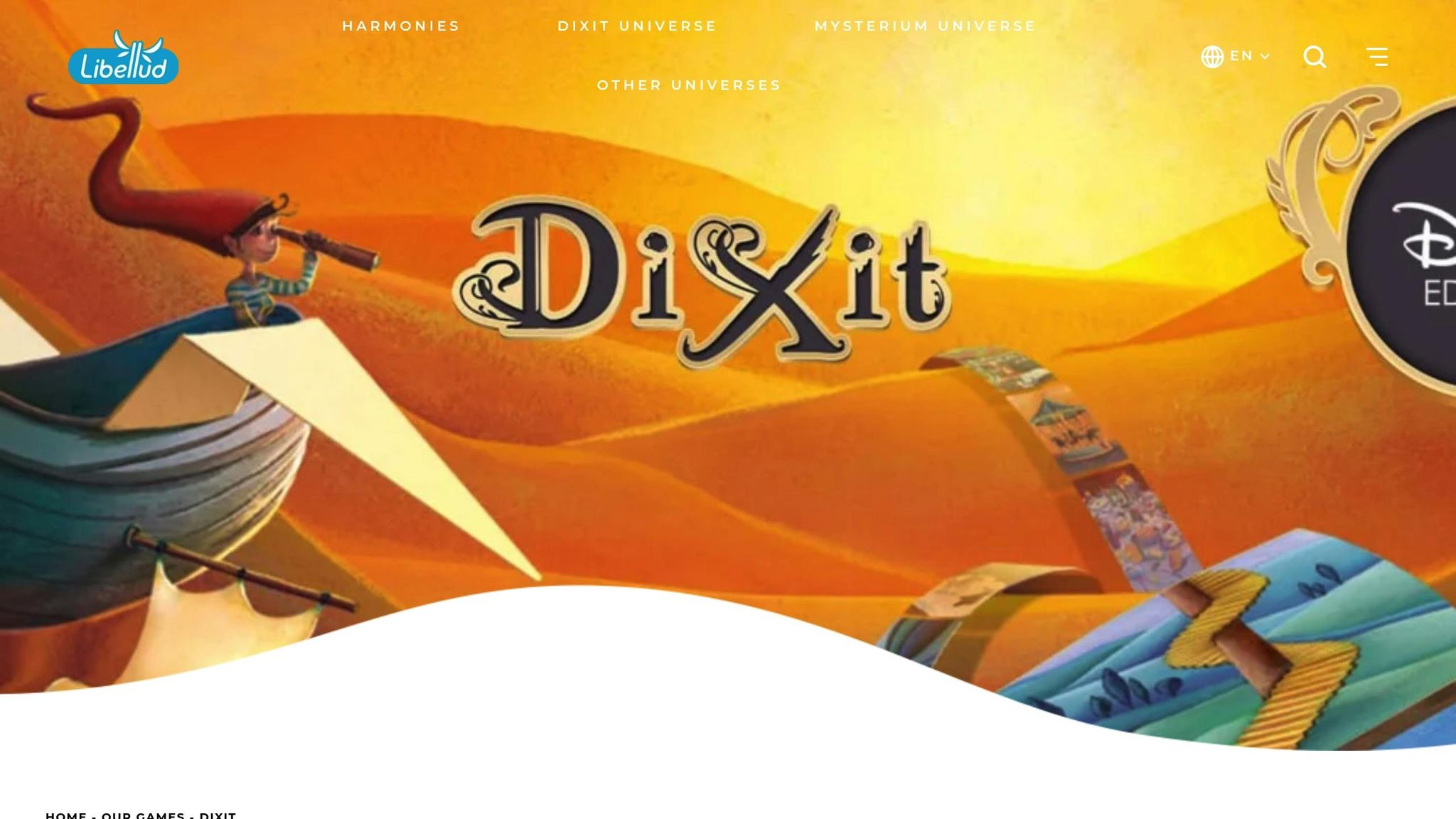
Dixit takes storytelling to a whole new level, encouraging players to match abstract illustrations with creative clues. Winner of the Spiel des Jahres in 2010, this game has sold over 12 million copies worldwide. Its stunning artwork and unique gameplay spark creativity, inviting players to think beyond the obvious and appreciate different perspectives. It’s a game that bridges generations, captivating both kids and adults alike.
Age Range Suitability
Dixit is perfect for families with players of various ages. Since it relies on visual clues rather than reading, it’s accessible to younger participants while still engaging for older ones. Designed for 3–6 players aged 8 and up, each game lasts about 30 minutes. With nearly 5,000 Amazon reviews and an impressive 4.8 out of 5-star rating, it’s clear that Dixit resonates with players across all age groups.
Cognitive Skill Development
This isn’t just a guessing game - it’s a workout for your imagination. Dixit encourages players to interpret abstract clues, consider different perspectives, and communicate effectively. It fosters creativity, sharpens analytical thinking, and promotes active listening. The game also builds social intelligence, making it as enriching as it is entertaining.
Social Interaction and Fun
At its core, Dixit thrives on creativity and shared experiences. Players are invited to merge their imagination with careful listening, leading to plenty of laughs and surprising moments.
As Justin Bell from Meeple Mountain puts it:
"Dixit is a blast to play because it's always a hoot to see what phrase active players will align to their card and hope that it gets just the right amount of love."
With its open-ended gameplay, no two sessions are ever the same. Expansions introduce fresh cards and artwork, keeping the experience lively and engaging. Instead of focusing on competition, Dixit fosters connection, making it an ideal choice for bringing families together through creativity and understanding. Next, let’s dive into another game that blends wit and strategy in exciting ways.
10. Catan

Catan has become a cornerstone in the world of strategy games, with over 30 million copies sold globally. In this resource management game, players compete to build settlements, cities, and roads while trading resources and striving for dominance over the island. Its mix of strategic depth and ease of play appeals to both beginners and experienced gamers.
Age Range Suitability
Catan is designed for 3-4 players aged 10 and up. The game’s simple rules can be picked up in minutes, making it approachable for younger players, yet it offers enough depth to keep adults engaged. With an average playtime of about 60 minutes, it’s perfect for family game nights. The modular board ensures each game feels unique, keeping players intrigued no matter how many times they play.
Cognitive Skill Development
Catan is a fantastic tool for sharpening critical thinking skills. Players must carefully balance long-term strategies with the ability to adapt to changing circumstances. This approach helps improve problem-solving abilities in kids, teens, and even young adults. The game’s focus on resource management, planning, and adaptability strengthens logical reasoning while encouraging players to juggle multiple factors at once. On top of that, the trading mechanics provide a great opportunity to practice negotiation skills, fostering communication and strategic compromise.
Social Interaction
One of Catan’s standout features is its trading system, which keeps players actively engaged in negotiations. Bartering isn’t just a side element - it’s a core part of the game, naturally sparking conversations and interactions among players. As Klaus Teuber, the game’s designer, once noted:
"Catan didn't just change games – it changed how we play together. It showed us that strategic depth and accessibility aren't mutually exclusive, creating a blueprint for modern game design that prioritizes player agency and interaction."
This emphasis on negotiation creates a unique mix of competition and collaboration, turning every trade into a social experience while players pursue their individual goals.
Fun and Replay Value
The base game of Catan delivers hours of entertainment, but its expansions take the experience to new heights. These add-ons introduce fresh mechanics and scenarios, ensuring the game evolves alongside your family’s interests. With its blend of strategy and luck, Catan offers something for everyone. Experienced players can refine their tactics, while newcomers can find success through clever trades and a bit of fortune.
This combination of variety, challenge, and accessibility ensures that every game session feels fresh, making Catan a standout choice for both casual and dedicated players alike.
Game Comparison Chart
This chart highlights essential details - age range, player count, playtime, and cognitive benefits - to help you pick brain games that fit your family's needs and keep everyone engaged.
| Game | Age Range | Players | Playtime | Primary Cognitive Benefits |
|---|---|---|---|---|
| Ice Cool | 6+ | 2-4 | 30 min | Hand-eye coordination, spatial reasoning, fine motor skills |
| BrainBox: The World | 8+ | 1+ | 10 min | Memory retention, visual processing, general knowledge |
| Codenames | 10+ | 2-8 | 15 min | Word association, lateral thinking, communication |
| Ticket to Ride | 8+ | 2-5 | 60 min | Strategic planning, pattern recognition, geography |
| Forbidden Island | 10+ | 2-4 | 30 min | Cooperative problem-solving, risk assessment, teamwork |
| Concept | 10+ | 4-12 | 40 min | Abstract thinking, creative communication, deduction |
| Herd Mentality | 10+ | 4-20 | 20 min | Social awareness, group psychology, quick thinking |
| Sushi Go! | 8+ | 2-5 | 15 min | Set collection strategy, probability assessment, decision-making |
| Dixit | 8+ | 3-6 | 30 min | Creative storytelling, imagination, interpretation skills |
| Catan | 10+ | 3-4 | 60 min | Resource management, negotiation, strategic planning |
When choosing a game, think about the type of experience you’re after. For shorter play sessions or younger kids with shorter attention spans, quick games like BrainBox: The World and Sushi Go! are ideal. If you’re looking for a balanced challenge that works for a family game night, medium-length games such as Ice Cool, Dixit, and Forbidden Island are great options. For families with older kids or adults who enjoy deeper strategy, longer games like Ticket to Ride and Catan deliver a more immersive experience.
Games like Herd Mentality are perfect for larger gatherings, as they can include up to 20 players. On the other hand, BrainBox: The World stands out for its solo-play option, making it a great choice for individual skill-building. Cooperative games, such as Forbidden Island, are especially helpful for younger players because they focus on teamwork rather than competition, reducing frustration while encouraging social interaction. These types of games also reinforce valuable social habits like taking turns, following rules, and working together.
For teenagers and adults, more complex games like Codenames, Concept, and Catan offer a greater intellectual challenge. These games encourage advanced thinking, emotional regulation, and even boost self-esteem through problem-solving and collaboration.
Each game brings unique cognitive benefits. For instance, memory-focused games like BrainBox: The World help sharpen attention and recall, while communication-heavy games such as Codenames and Concept enhance verbal and social skills. Strategic titles like Catan and Ticket to Ride strengthen logical reasoning and decision-making.
To keep game nights exciting, mix things up by rotating between quick, medium, and strategic games. This variety ensures that everyone stays engaged and entertained.
Conclusion
Exploring a variety of brain games reveals how each one uniquely enhances mental sharpness while fostering closer family connections. These games are more than just entertainment - they stimulate areas of the brain tied to memory and complex thinking, benefiting players of all ages.
The impact goes far beyond individual cognitive gains. Research highlights that families who prioritize activities like game nights often see wide-ranging benefits, especially for children. From larger vocabularies as early as age two to better reading scores throughout school and improved emotional health, the advantages are profound.
"Research has found that making time to play games together supports more effective, open family communication and a greater sense of togetherness."
- Kelseanna Hollis-Hansen, PhD, MPH, UT Southwestern Medical Center School of Public Health
Games like Ticket to Ride and Dixit not only engage the mind but also encourage meaningful conversations, while fostering social skills. Studies with preschoolers show that playing both competitive and cooperative games boosts prosocial behaviors such as sharing, helping, and complimenting others. Pat Stephenson, a Youth Services Assistant at Bensalem Branch, sums it up perfectly:
"It's good to get together with friends and family and engage in face-to-face interaction. I enjoy spending quality time while enjoying board games."
Whether it’s a quick 10-minute round of BrainBox: The World or a strategic hour with Catan, these games fit seamlessly into any family’s schedule. Turning off electronics and dedicating time to game nights can strengthen bonds and create cherished memories.
For those looking to build their collection, Brain Games offers a wide selection of titles at Brain-Games.lv/en/. Whether your goal is to sharpen memory, improve communication, or simply share laughter-filled moments, these games provide the perfect foundation for quality family time.
Start your game night today - because a simple game can lead to stronger connections and sharper minds.
FAQs
How do I pick the best brain game for my family with different ages and interests?
When choosing a brain game for a family with a mix of ages, start by checking the recommended age range on the game box. This ensures the game will be enjoyable and appropriate for everyone, from the youngest to the oldest players.
Next, think about your family’s shared interests and favorite themes. Games that connect to hobbies or common passions tend to be the most engaging. Don’t forget to factor in the game’s playtime - shorter games are great for kids with limited attention spans, while slightly longer ones might better suit older players.
Lastly, take a moment to read reviews or game descriptions. Look for games that are easy to learn and cater to various skill levels, ensuring everyone can join in on the fun.
What are the benefits of playing brain games as a family with different age groups?
Playing brain games together as a family can be a fantastic way to connect while sharpening the mind. These games are known to enhance memory, problem-solving abilities, and critical thinking for everyone, regardless of age. Plus, they naturally encourage teamwork and communication, making family time more meaningful and enjoyable.
For kids, these games can support learning and cognitive growth, giving them a fun way to develop essential skills. Meanwhile, older family members may find that playing these games helps keep their minds sharp and improves memory. A regular family game night isn’t just about having fun - it’s an opportunity to bond, learn, and share quality moments that everyone will cherish.
How do brain games help families connect and communicate better during game nights?
Brain games offer a great way for families to connect while having fun. They create an engaging, interactive atmosphere that promotes teamwork, face-to-face interaction, and problem-solving. These activities naturally strengthen relationships and improve communication among family members of all ages.
Beyond just entertainment, brain games help create memorable moments and shared experiences. Whether it’s teaming up to crack a tricky puzzle or enjoying some lighthearted competition, these games turn ordinary evenings into special family traditions, making the time spent together both meaningful and enjoyable.






